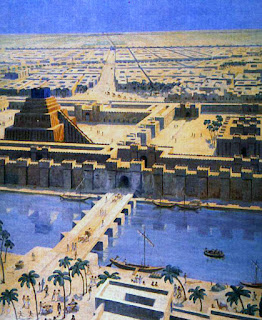- 608BCE- Yehoyakim appointed king of Judah by Pharaoh Necho
- 605BCE- Nebuchadnezzar's father dies, becomes king
- 605BCE- Battle of Carchemish, Nebuchadnezzar seige of Jerusalem. Yehoyakim/Judah join Babylonian Empire. First deportation of Babylonian Exile
- Daniel 1
- 604BCE
- Daniel 2, 3?
- 601BCE- Yehoyakim renews allegiance to Egyptian empire
- 598BCE- Nebuchadnezzar seige of Jerusalem. Yehoyakim deposed, maybe killed
- 588BCE- Destruction of 1st Temple
- 562BCE- Nebuchadnezzar dies
- 562 to 560BCE- Amel Marduk king of Babylon
- 560 to 556BCE- Neriglissar king of Babylon
- 559BCE- Cyrus the Great becomes king of Persia under Medes
- 556BCE- Labashi-Marduk king of Babylon
- 556–539BCE- Nabonidus king of Babylon
- Daniel 4
- 553-550?BCE- Cyrus conquers Medes
- 553-543BCE- Belshazzar rules as regent while Nabonidus is in Teima
- Daniel 5, 7, 8
- 539BCE- Cyrus the Great conquers Babylon. Commands building of 2nd temple
- Daniel 6, 9?
- 537BCE
- Daniel 10-12
- 530BCE- Cyrus dies in Battle
Historical Problems in Daniel
What problems arise when we try to map the happenings in Daniel to this chronology?
- Ch. 1- The books of Daniel, Melachim, Divrei Hayamim, Yirmiaya, Josephus all give differing accounts of Yehoyakim's defeat and death(a good summary can be found in “Jehoiakim Slept with his Fathers…” (II Kings 24:6) – Did He?, Oded Lipschits)
- No minister by the name of Daniel is recorded in any other Babylonian/Persian source. On the other hand, Daniel is mentioned in Ezekiel(during the Babylonian exile), and Ezra(100 years later).
- Ch. 4- No prolonged absence of Nebhuchadnezzar from the throne is known to history. On the other hand, Nabonidus' absence is well established, including the Prayer of Nabonidus scroll from Qumran)
- Ch. 5, 7,8- Belshazzar never seems to have been King, rather he was Crown Prince and Regent
- Ch. 6, 9- The King, Darius the Mede, a contemporary of Cyrus who began his reign at 62 years old, is unknown to history. Darius the Great only came to rule the Persian empire in 522BCE at the age of 28, but perhaps the text is referring to some other milestone that happened later in his kingship. Even so, assuming that Daniel was about 10 years old in 598BCE, he would have been 110 years old by the time Cyrus the Great was 62, which seems farfetched
- Ch. 9- the 70 year calculation for the rebuilding of Jerusalem is not so straightforward. Different commentators attempt to explain the calculation. Many even gave up and concluded that Daniel miscalculated ("כל הגאונים פה אחת הסכימה דעתם עם דעת הקדמונים שאמרו שטעה דניאל בחשבונו" אבן עזרא על דניאל ט:ב)
 |
| Nabonidus Cylinder |
Composition
These Historical issues with the book of Daniel raise the question whether the stories therein are historically factual. Did a Jew named Daniel really rise to prominence in the Babylonian and Persian courts? Did all these miracles and visions actually happen to him?
This sort of question is not foreign to traditional commentary. For instance, one Amora opined that the Book of Job is ahistorical:
יתיב ההוא מרבנן קמיה דר' שמואל בר נחמני ויתיב וקאמר איוב לא היה ולא נברא אלא משל היה(בבא בתרא טו.)
 |
| Antiochus IV Epiphanes |
- The symbolic reference to Antiochus Epiphanes in Daniel 7
- Daniel's absence from the Canonization of Prophets and from Ben Sira
- It's presence in the Sibylline Oracles and Qumran Caves
The Value of Daniel
So, assuming the Book of Daniel was compiled up to 400 years after the period it portrays and it's historical accuracy is a bit sketchy, what are it's merits? More specifically, why did the Men of the Great Assembly choose to include this scroll in the biblical canon?
 |
| Daniel and his companions requesting kosher meals |


Another fascinating piece. Daniel was inspiration for the midrash of Abraham and nimrod?!
ReplyDeleteWell, both are stories where the monotheistic heroes are throw into a fiery furnace by idolatrous kings and miraculously saved. There are 3 possibilities: 1) the same thing actually happened twice 2) Abraham & Nimrod is the original version of the story and inspired the story in the Book of Daniel 3) Daniel is the original and the midrash was inspired by it
DeletePersonally, I think 3) seems the most likely. Daniel was canonized at least 450 years before Midrash Rabba. Also, the Abraham/Nimrod midrash sounds apocryphal, whereas the Daniel story is likely historical. I'm also pretty sure I saw Rav Yaakov Meidan write that Daniel inspired the midrash in his book on Daniel, through I can't find it at the moment...